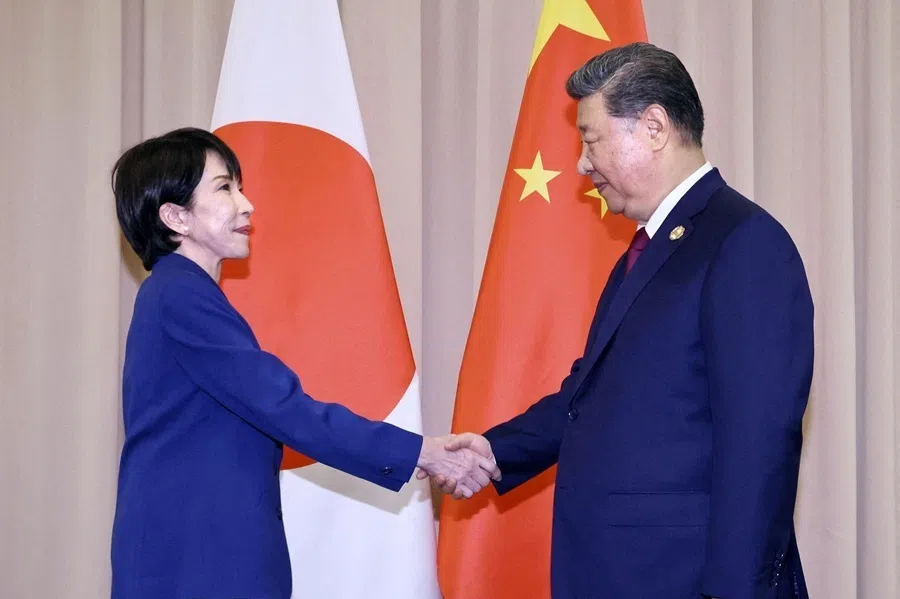How Israel-Hamas war has revived debate on the clash of civilisations
Both Hamas and Israel have framed their war over Palestinian national independence as religious and civilisational, says academic Ma Haiyun. This seems to fit into Samuel Huntington's "clash of civilisations" theory, even though to define Israeli-Palestinian conflict as a cultural fault line war is historically, religiously and intellectually untrue. Such rhetoric is dangerous, especially when talk of religious wars is turning into reality, and the US's "Israel first" policy is undermining US diplomacy, soft power, reputation, and most importantly, international institutions such as the UN that the US has sustained after World War II.
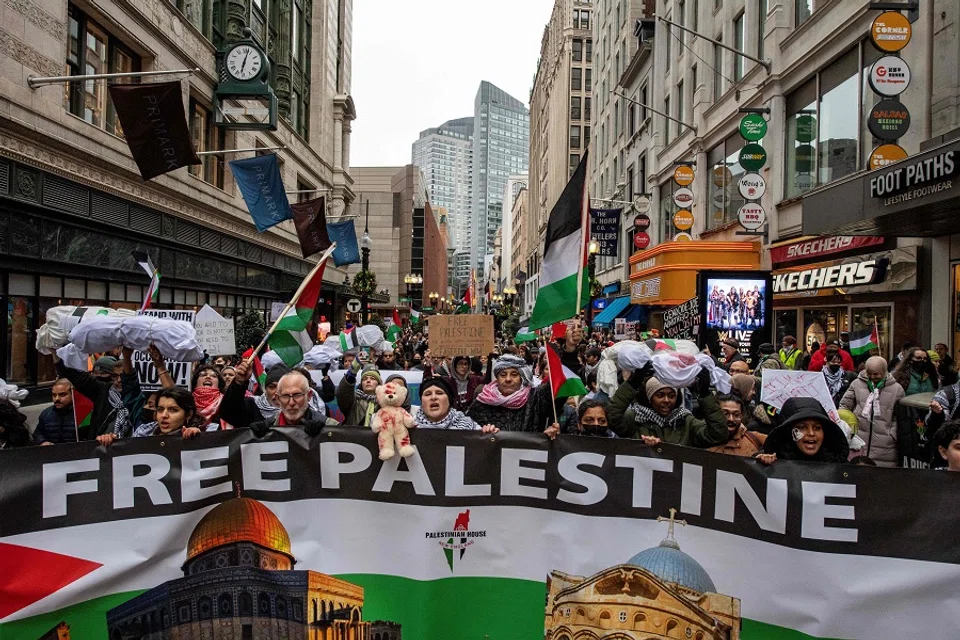
On 7 October, Hamas attacked Israel, storming over 20 settlements and outposts and 11 military sites including the Gaza Division headquarters. Subsequently, Israel's "mowing the grass" bombardment and ground invasion of Gaza slaughtered over 18,000 Palestinians.
Western leaders including those from the US and the EU have framed Hamas's military operations as terrorist attacks. President Joe Biden made such remarks after the 7 Oct attack and during his visit to Israel, as did the European Council and European Parliament.
National cause and military means of Hamas
Despite such political accusations, the international consensus is that the root cause of the Palestinian-Israeli conflict is due to the failure of implementing a two-state solution - a Palestinian state and a Jewish state.
Following the UN partition of Palestine, Jewish people established the state of Israel in 1948. In the following decades, the Palestinian state failed to materialise due to the wars with the newly founded Israel. The post-colonial formation of new neighbouring Arab nation-states and their subsequent defeat by Israel gradually marginalised the Palestinian issue.
The recent outbreak of conflict between Hamas and Israel underlines the urgency of this unfinished mission. President Biden has pushed Middle East leaders to consider a two-state solution after the Israel-Hamas war ends and said a "real" Palestinian state must come after war. Regional countries and other major powers such as the Arab states, the EU, France, the UK, China and Russia all agree on working towards a two-state solution. The UN has repeatedly called for an "irreversible" move towards a two-state solution, as it did in the past several decades. A two-state solution points to the century-long national quest for independence of Palestinians following the collapse of the Ottoman Empire.
Such a peaceful approach to territorial recovery and national independence has emboldened Israel to expand illegal settlements in Palestinian territories.

Despite the Western designation of Hamas as a terrorist organisation and Hamas's self-identification as an Islamic resistance movement, Hamas is essentially a national resistance force, defining itself as "an outstanding type of Palestinian movement". Hamas was borne out of the failure of Arab nationalism and Palestinian nation-building, as well as Arab countries' repeated defeat by Israel and its West backers since the Cold War.
Several Arab countries such as Egypt, Syria and even the Palestinian Liberation Authority (or Fatah) adopted a pacifist approach to Israel-occupied territories. Such a peaceful approach to territorial recovery and national independence has emboldened Israel to expand illegal settlements in Palestinian territories. Hamas highly resembles the early Zionist-terrorist organisations such as the Haganah, Irgun Awai Leumi, and the Lohamei Herut in their quest for national independence.
Framing Palestinian-Israeli wars as religious and civilisational
Hamas and Israel have framed their war over Palestinian national independence as religious and civilisational. Hamas frames its military action as "Operation Al-Aqsa Flood" and a direct response to ongoing Israeli aggression against Jerusalem and attempts to Judaize the Arab/Muslim holy mosque, Al-Aqsa mosque, especially during the month of Ramadan in 2023. To frame the military operation this way is clearly to appeal to the support of Arabs and Muslims.
During the war, former Hamas chief Khaled Meshaal called for protests across the Muslim world on Friday, 13 October in support of the Palestinians and for the peoples of neighbouring countries to join the fight against Israel. Similarly, Iran's Islamic Revolutionary Guard Corps urged "Jihad" amid the Gaza war.
Except for pro-Iran militant groups in Yemen (the Houthis), Iraq (Kataib Hezbollah and Harakat Hezbollah al Nujaba in Iraq), Lebanon (Hezbollah) and Syria that have sporadically attacked either Israel or the US bases with little success, no nation in the region or beyond has joined Hamas against Israel or the US.
In other words, just like Hamas's Al Aqsa Flood, Netanyahu presented a Jewish "holy war" or religious genocide in Gaza.
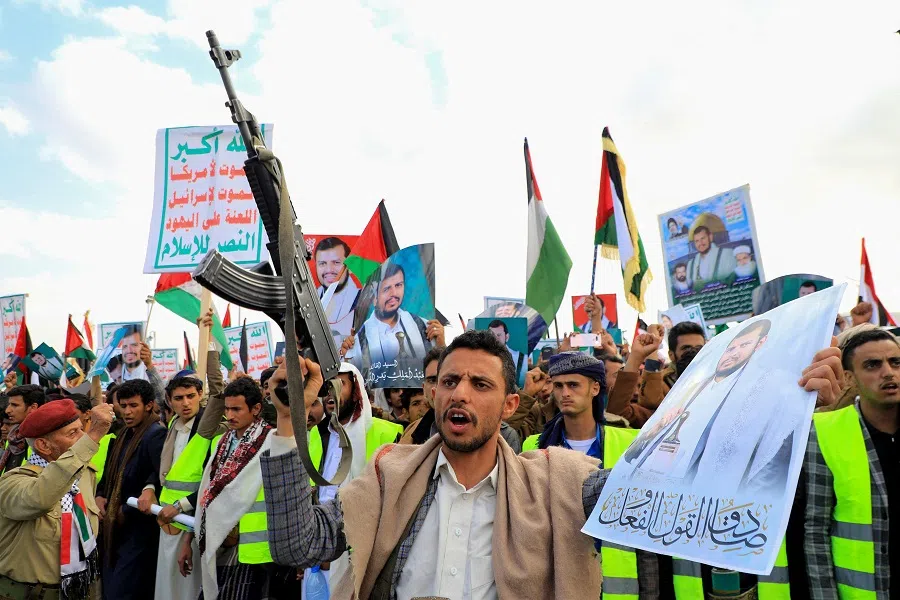
The Israeli counter-framing of the war similarly deploys religious and civilisational terms. To justify Israeli bombardment and ground invasion of Gaza, Israeli Prime Minister Benjamin Netanyahu made remarks on 16 October, stating "this is a struggle between the children of light and the children of darkness, between humanity and the law of the jungle", though failing to mention Israel occupation. This framing is clearly geared towards appealing to American evangelicals by referring to the influential Protestant theologian Reinhold Niebuhr's book The Children of Light and the Children of Darkness.
On the evening of 28 October, Israeli Prime Minister Netanyahu even quoted Deuteronomy 25:17 ("You must remember what Amalek did to you") to associate Hamas with the biblical and mythological Amalek. Anyone familiar with the Hebrew scriptures knows that Deuteronomy 25:19 later calls for the killing of the entire nation of Amalek (or the first recorded genocide) as well as its animals in I Samuel. In other words, just like Hamas's Al Aqsa Flood, Netanyahu presented a Jewish "holy war" or religious genocide in Gaza.
To justify the indiscriminate destruction of Gaza, Netanyahu quoted more teachings from the Hebrew Bible (Tanakh) and the Old Testament of the Bible: "With shared forces, with deep faith in the justice of our cause and in the eternity of Israel, we will realise the prophecy of Isaiah 60:18 - 'Violence shall no more be heard in your land, desolation nor destruction within your borders; but you shall call your walls Salvation, and your gates Praise'."
Huntington's selective criteria of culture and the imagination and making of West (Judeo-Christian) civilisation was essentially a political appeal to the US to forge alliances with similar cultures...
The clash of civilisations theory
The framing and rhetoric of the ongoing war by both Hamad and Israel resembles the "clash of civilisations" thesis presented by Samuel Phillips Huntington in 1993, which has sparked heated debate among scholars.
Prior to the publication of Huntington's thesis, an Israeli-naturalised American scholar Leon T. Hadar pointed out in his 1992 analysis "The 'Green Peril': Creating the Islamic Fundamentalist Threat" that the US foreign policy establishment began searching for new enemies after the end of the Cold War: "Topping the list of potential new global bogeymen, however, are the Yellow Peril, the alleged threat to American economic security emanating from East Asia [China], and the so‐called Green Peril (green is the color of Islam)."
Huntington's selective criteria of culture and the imagination and making of West (Judeo-Christian) civilisation was essentially a political appeal to the US to forge alliances with similar cultures, filling the void left by waning political ideologies during the Cold War.
The default core of this alliance-building through the so-called Western civilisation was to protect Israel in the post-Cold War era. Interestingly enough, among the major civilisations Huntington identified, Jewish civilisation was forgotten, so was the intimacy between Arabs and Jews, Arabic and Hebrew, and among Abrahamic traditions.
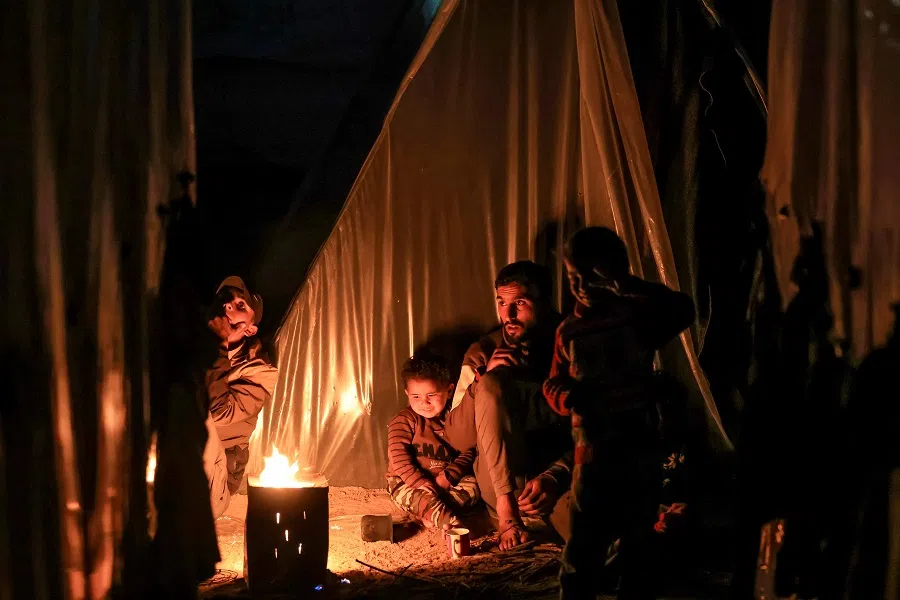
Although Huntington's religious identity remains enigmatic, Huntington claimed to be a disciple of the great protestant theologian Reinhold Niebuhr whose book The Children of Light and the Children of Darkness that Netanyahu quoted from on 16 Oct. Huntington's phrase of "clash of civilisations" is thought to have been first coined by Israeli scholar Bernard Lewis, a chief ideologue of post-9/11 politics of hate towards Islam and Muslims.
Said an obituary of Lewis in 2018: "Dr. Lewis's friendship - and ideological kinship - with the Cold War hawk...opened prominent doors in the capital, eventually giving Dr. Lewis favored status among top White House and Pentagon planners before the 2003 invasion of Iraq." Huntington's thesis was embraced by neoconservative groups in 2001, with the inauguration of the team of President George W. Bush and Vice-President Dick Cheney.
Although to define Israeli-Palestinian conflict as a cultural fault line war is historically, religiously, and intellectually untrue, Huntington's theory of the clash of civilisations seems specifically developed for the Palestinian-Israeli conflicts. Israeli scholars have not only actively received but eagerly expanded this thesis.
Among them, historian Benny Morris acknowledges frankly that in the 1990s (the timing is significant given the publication of Huntington's thesis in 1993), he devoted his time to writing a comprehensive history of the Israeli occupation and Palestinian resistance as a clash between the two peoples - between the Zionists and the Arab world - and complained that former President Obama did not see the Palestinian-Israeli conflicts this way.
The clash of civilisations practice
Israeli politicians have attempted to translate and implement the clash of civilisations thesis into policy.
Immersed in the clash of civilisations thesis, Israeli opposition leader Ariel Sharon ignited religious violence in 2000 by claiming sovereignty over Haram al-Sharif, or the Noble Sanctuary that contains Al Aksa Mosque and the Dome of the Rock, the sacred shrines of Islam in Jerusalem. This purportedly caused the conflict with the Palestinians, leading to the second Palestinian uprising, or intifada.
More recently, Israel's storming of Al Aqsa Mosque during this year's Ramadan month and a Netanyahu ally's proposal to split Al Aqsa were contributing factors leading to Hamas's Operation Al Aqsa Flood on 7 October.
The Israeli strategy of strengthening Hamas was not simply for the purpose of dividing the Palestinian authority in peaceful time but also to use Hamas as a religious and militant group as justification for the clash of civilisations propaganda at war time.
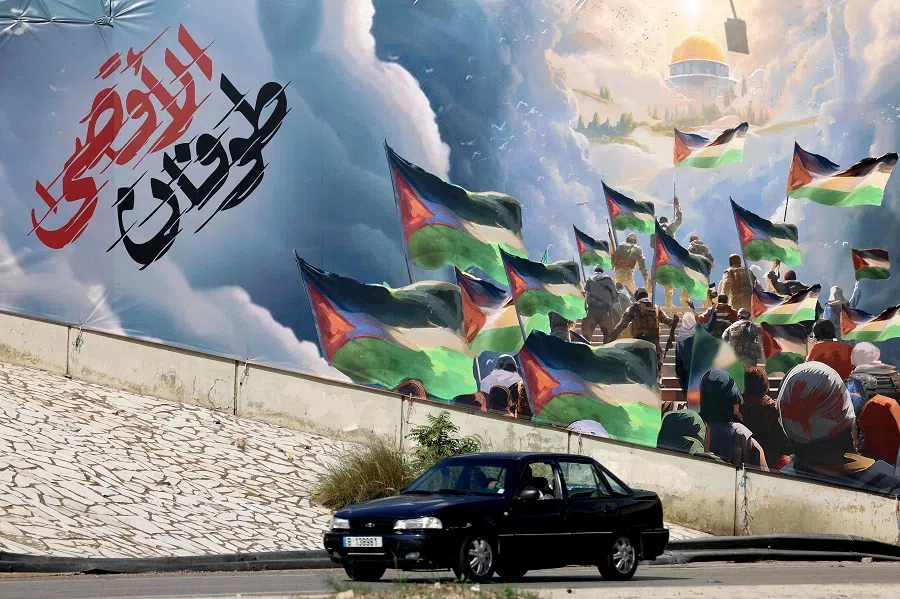
As the Times of Israel reported, the various governments led by Benjamin Netanyahu took an approach that divided power and leadership between the Gaza Strip and the West Bank. Hamas was treated as an asset by Israeli governments especially after Hamas won the Gaza election in 2006. Thereafter, the Israeli government had indirectly strengthened Hamas and upgraded it from a militant organisation to an effective governing body by increasing work permits in Israel and allowing flow of funds into Gaza.
The Israeli strategy of strengthening Hamas was not simply for the purpose of dividing the Palestinian authority in peaceful time but also to use Hamas as a religious and militant group as justification for the clash of civilisations propaganda at war time. This precisely happened when Hamas and Israel entered the war. Netanyahu's religious rhetoric attempted to form a West civilisation against the Palestinians and Muslims.
The clash of civilisations export
The US invasion of Iraq as the implementation of the clash of civilisations thesis resulted in a miserable end, after thousands of American soldiers died in Iraq. Barack Obama's election was a political correction and critique of the thesis.
Obama embraced a new doctrine based on realism and internationalism to guide the US in international relations, thus putting an end to the clash of civilisations. Regarding the Middle East, Obama stated, "I consider it part of my responsibility as President of the United States to fight against negative stereotypes of Islam wherever they appear." He added that "it is also undeniable that the Palestinian people - Muslims and Christians - have suffered in pursuit of a homeland".
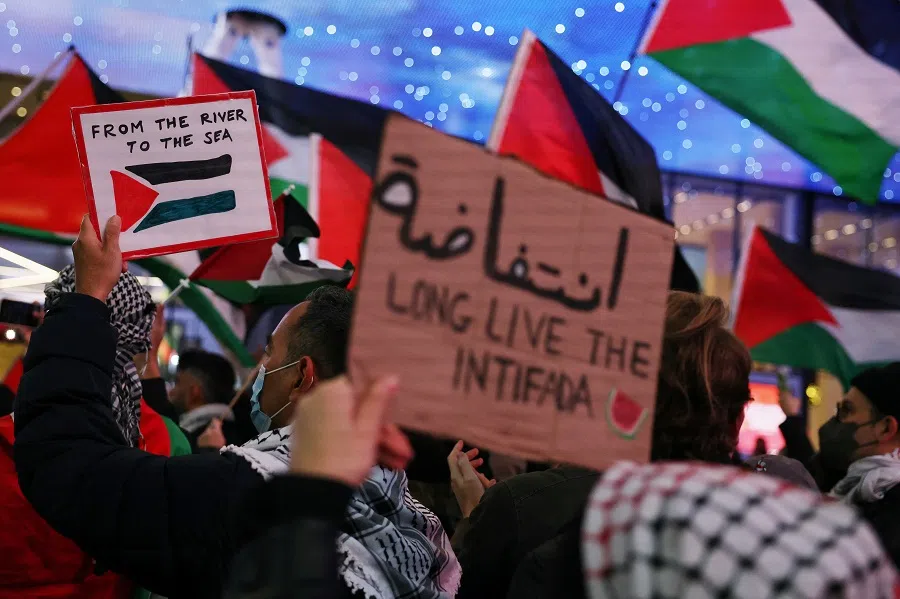
Now, the renewed conflict between Israel and Hamas has revived the clash of civilisations rhetoric, especially among Israeli rightists and lobbyists. Netanyahu threatened Europe and America that if "we don't win now, then Europe is next, and you're (the US) next", as if Hamas were waging a global war against Europe and the US. Jake Wallis Simons, editor of the Jewish Chronicle, attacked all Muslims by generalising that "much of Muslim culture is in the grip of a death cult that sacralises bloodshed".
US House Speaker Mike Johnson returns to oft-debated relations between the Jews as the chosen people and Christians and tells Republican Jews that "God is not done with Israel" by quoting Romans 11: 1-2. It is not surprising that he framed the Hamas-Israeli war as a "religious war". Senator Lindsey Graham even attacked the UN as the "most anti-Semitic body on the planet" after calling on the UN to condemn Hamas, which the UN Assembly repeatedly rejected.
Jewish congressman Representative Max L. Miller echoed and called the UN, which has urged protection of civilian lives, an "anti-Semitic organisation" and referred to Israel's opponents as "savages" who "raise [their] children to kill Jews". US Secretary of State Anthony Blinken told Israel during his visit, "I come before you not only as the United States secretary of state, but also as a Jew," combining US politics with Jewish identity in support of Israel.
... Israel's occupation of Palestine not only diverts US resources from competing with major powers but also undermines US influence in the global south.
Conclusion
As a nation state, the US is an ardent builder and holder of the current nation-state-based international order. However, the Biden administration adopted a religious - and not legal - approach to the Israeli-Hamas war, ignoring international laws and international institutions, which has cost Washington severely on several fronts.

Domestically, Biden's seemingly blind support for Israeli genocide earned him the moniker "Genocide Joe" and risks losing Muslim voters in swing states in the upcoming election. American universities and the public are highly divided between supporting Israel and abiding by international laws including protecting human rights.
Internationally, the sole US veto against the UN resolution for ceasefire in Gaza, among other unconditional and unethical support to the Israeli war machine, constitutes in reality a "Israel first" policy, greatly undermining US diplomacy, soft power, reputation, and most importantly, international institutions such as the UN that the US has sustained after World War II. In a divergent world, Israel's occupation of Palestine not only diverts US resources from competing with major powers but also undermines US influence in the global south.





